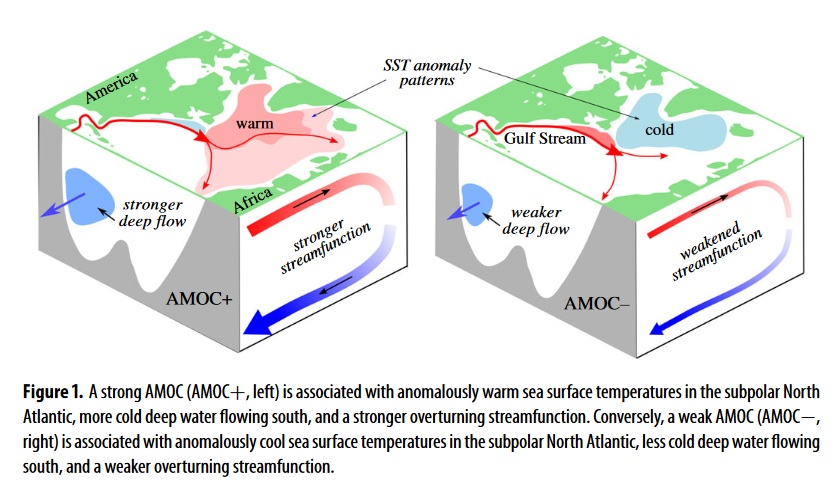
The Atlantic Meridional Overturning Circulation (AMOC), a crucial element of the Earth’s climate system, is projected to weaken over the course of the twenty-first century which could have far reaching consequences for the occurrence of extreme weather events, regional sea level rise, monsoon regions and the marine ecosystem. The latest IPCC report puts the likelihood of such a weakening as ‘very likely’. As our confidence in future climate projections depends largely on the ability to model the past climate, we take an in-depth look at the difference in the twentieth century evolution of the AMOC based on observational data (including direct observations and various proxy data) and model data from climate model ensembles. We show that both the magnitude of the trend in the AMOC over different time periods and often even the sign of the trend differs between observations and climate model ensemble mean, with the magnitude of the trend difference becoming
even greater when looking at the CMIP6 ensemble compared to CMIP5. We discuss possible reasons for this observation-model discrepancy and question what it means to have higher confidence in future projections than historical reproductions.
This article is part of a discussion meeting issue ’Atlantic overturning: new observations and challenges.
It is said that the only person who believes a model is the person who built it and that everyone believes an experiment/observation apart from the person who performed it. The challenge facing the AMOC community is either to reconcile the differences between climate models and observations or to better understand the reasons for deviation. Only with improved agreement and convergence will future IPCC reports be able to move from assessments of low confidence in
this crucial climate variable.
CONCLUSION
We finish with a pessimistic statement: if it is not possible to reconcile climate models and observations of the AMOC in the historical period, then we believe the statements about future confidence about AMOC evolution should be revised. Low confidence in the past should mean lower confidence for the future! The IPCC AR6 report ranks it as very likely that the AMOC
will decline in a changing climate. But, if these models cannot reproduce past variations, why should we be so confident about their ability to predict the future? Likewise, the IPCC AR6 reports medium confidence that there will be no collapse in the AMOC. But, with missing ice and freshwater dynamics, the processes that could initiate a collapse are unlikely to be simulated.
We believe that progress needs to be made in understanding why models do not reproduce past AMOC variability and that this is the key to having confidence in the future evolution of this key climate variable.
Source: https://royalsocietypublishing.org/doi/pdf/10.1098/rsta.2022.0193
